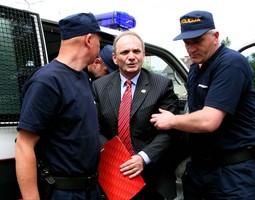Published in Nacional number 705, 2009-05-19
Serbs to extradite Glavas
THE COORDINATOR OF THE BOSNIAN court and prosecution in the Branimir Glavas case bears witness to the pressure put on the institutions of Bosnia & Herzegovina by the Office of the High Representative and the US embassy in Sarajevo
 THE SHOCKING SIGHT of Branimir Glavas in handcuffs surprised everyone in Croatia: most observers expected the fugitive from Croatian authorities to go unpunished as a citizen of Bosnia & Herzegovina The decision of Branko Peric, a judge with the Court of Bosnia & Herzegovina, to remand Branimir Glavas to police custody and to launch the procedure for his extradition to Croatia has shocked many, both in Bosnia & Herzegovina and in Croatia. No less shocking was the quick release of Glavas from detention, but with a continuation of the case in an open extradition procedure. Clearly, the judicial institutions in Bosnia & Herzegovina have grasped that they have no legal grounds on which to keep Branimir Glavas in police custody.
THE SHOCKING SIGHT of Branimir Glavas in handcuffs surprised everyone in Croatia: most observers expected the fugitive from Croatian authorities to go unpunished as a citizen of Bosnia & Herzegovina The decision of Branko Peric, a judge with the Court of Bosnia & Herzegovina, to remand Branimir Glavas to police custody and to launch the procedure for his extradition to Croatia has shocked many, both in Bosnia & Herzegovina and in Croatia. No less shocking was the quick release of Glavas from detention, but with a continuation of the case in an open extradition procedure. Clearly, the judicial institutions in Bosnia & Herzegovina have grasped that they have no legal grounds on which to keep Branimir Glavas in police custody.
But Glavas definitely has cause for great concern. The explanation given by Judge Branko Peric, an ethnic Serb, that the Bosnia & Herzegovina citizenship Glavas received in November of 2008 cannot be inflexibly interpreted and serve as automatic protection from the extradition to a country that has issued an international warrant is for many legal experts legally unsustainable and inexplicable. It is clear that in issues of citizenship it has so far had unused legal grounds. It is also quite clear that the Court of Bosnia & Herzegovina and the Prosecutor's Office of Bosnia & Herzegovina were entirely coordinated and had an identical reaction. And just as the decision of the Court of Bosnia & Herzegovina on Glavas's detention and the launching of the procedure to extradite him to Croatia is, in fact, in part legally questionable, so too was the Prosecutor's Office in Bosnia & Herzegovina quick to make an evident precedent. Rather than by prosecutor Jadranka Loknic, Glavas's case was immediately taken by the Chief Prosecutor at the Prosecutor's Office of Bosnia & Herzegovina, Milorad Barasin. Barasin, also an ethnic Serb, has said that justice also had to be done in the case of Glavas's flight to Bosnia & Herzegovina and invoking of the country's citizenship. After all, it is a conviction for war crimes.
The speedy reaction of the president of the High Court Chamber and the simultaneous reaction of Milorad Barasin can in no way be interpreted as a coincidence, an even less as an act of revenge on the part of two ethnic Serb justice official in Bosnia & Herzegovina. A coordinated pressure on the Bosnian Court and Prosecutor's Office to react quickly and adopt a decision that will bring into question Glavas's receipt of citizenship in Bosnia & Herzegovina was undertaken by the Office of the High Representative in Bosnia and the US embassy in Sarajevo. "Glavas's flight and his unpunished residence in Bosnia & Herzegovina would be a bad message to the entire region of the easy outwitting of justice and a flight from responsibility when it comes to criminal activity and crime, and war crimes in particular," was the very clear position of our source, the representative of an international institution in Sarajevo. Chief Prosecutor Barasin cooperates closely with the US and with the Office of the High Representative in Sarajevo.
The fact that the High Representative for Bosnia & Herzegovina, Austrian Valentin Inzko, visited the Court of Bosnia & Herzegovina and its president Meddzida Kreso on the same day that judge Peric ruled that Glavas was to be remanded to extradition detention was not crucial to the outcome of the case. Inzko is in the process of taking over at the post and is touring Bosnian institutions, and the date of the visit is a  MEDIA CLAIMS that Croatian Government and Prime Minister Ivo Sanader are behind the arrest of Branimir Glavas are complete nonsense: only the pressure exerted by the international community was importantmere coincidence. But, Inzko's visit was only confirmation of what Raffi Gregorian, the deputy to the High Representative in Bosnia, had already seen to. Gregorian, an American, was the person that suggested to the chamber of judges of the country's highest court, the Court of Bosnia & Herzegovina, that it agree on the detention of Branimir Glavas and to open the procedure for his extradition in which it will be established whether Glavas's acceptance into Bosnian citizenship was simply an abuse of the citizenship of a neighbouring country and a flight in the face of a guilty verdict, still subject to appeal, condemning him to ten years in prison for war crimes committed in Osijek. What does not work in Glavas's favour is the fact that, regardless of assurances that it absolutely is a legal precedent, the international community in Sarajevo, including Inzko's Office of the High Representative, is convinced that Glavas fled to Bosnia & Herzegovina precisely for that reason.
MEDIA CLAIMS that Croatian Government and Prime Minister Ivo Sanader are behind the arrest of Branimir Glavas are complete nonsense: only the pressure exerted by the international community was importantmere coincidence. But, Inzko's visit was only confirmation of what Raffi Gregorian, the deputy to the High Representative in Bosnia, had already seen to. Gregorian, an American, was the person that suggested to the chamber of judges of the country's highest court, the Court of Bosnia & Herzegovina, that it agree on the detention of Branimir Glavas and to open the procedure for his extradition in which it will be established whether Glavas's acceptance into Bosnian citizenship was simply an abuse of the citizenship of a neighbouring country and a flight in the face of a guilty verdict, still subject to appeal, condemning him to ten years in prison for war crimes committed in Osijek. What does not work in Glavas's favour is the fact that, regardless of assurances that it absolutely is a legal precedent, the international community in Sarajevo, including Inzko's Office of the High Representative, is convinced that Glavas fled to Bosnia & Herzegovina precisely for that reason.
All of the stories and claims that Croatian Government and Prime Minister Ivo Sanader are behind the arrest and new treatment of Branimir Glavas are nonsense and complete fabrications, useful only to the election campaign of Sisljagic's and Glavas's political party. Ivo Sanader and Croatian Government were not the source of any pressure on the judicial institutions of Bosnia & Herzegovina, least of all on judges and prosecutors of Serbian ethnicity in Bosnia, because it is both unnecessary and unfeasible. It is even less possible that Croatian Government put pressure on the Office of the High Representative in Bosnia & Herzegovina. The Office had its own opinion on the matter, and Gregorian a clear mission.
Glavas has found himself in a special department of the Court of Bosnia & Herzegovina, foreseen for the detention of only the most serious cases. Currently detained there are Serbs accused of war crimes. Glavas's release as a result of the fact that there is no danger of his flight or ability to influence witnesses, for Glavas at this moment means both a lot and very little. A person feels much better outside of a prison cell, but he could in no way personally take part any more in the finale of the election campaign. On the other hand, it is up to the Prosecutor's Office of Bosnia & Herzegovina and Milorad Barasin to, over the coming 30 days try to establish the motives for Glavas's application for Bosnian citizenship and its sustainability in relation to the letter and spirit of the Citizenship Act of Bosnia & Herzegovina. Given that Barasin is, however, a person enjoying the confidence of the international community, and also the steadfast advocate of bringing to trial 12 Croatian generals, including Ante Gotovina, whom the Republika Srpska alleges committed war crimes in the area around Drvar and Grahovo during Operation Maestral and Operation Southern Sweep, there is little chance that the  RAFFI GREGORIAN, an American at the post of deputy to the high representative, is the key player of the international community in Bosniainterpretation of the Citizenship Act of Bosnia & Herzegovina could be seen outside of the context of the ruling, subject to appeal, of Zagreb County Court and the ten year sentence handed down for war crimes committed in wartime Osijek. Insofar there is a big chance that Branimir Glavas, despite having been received into Bosnian citizenship, could be extradited to Croatia.
RAFFI GREGORIAN, an American at the post of deputy to the high representative, is the key player of the international community in Bosniainterpretation of the Citizenship Act of Bosnia & Herzegovina could be seen outside of the context of the ruling, subject to appeal, of Zagreb County Court and the ten year sentence handed down for war crimes committed in wartime Osijek. Insofar there is a big chance that Branimir Glavas, despite having been received into Bosnian citizenship, could be extradited to Croatia.
No one in Bosnia & Herzegovina disputes the legal grounds of Glavas's Bosnian citizenship. The Bosnian Ministry of Civil Affairs, led by Minister Sredoje Novic, also an ethnic Serb, approved, in November of 2008, the entry of Branimir Glavas into the Register of Citizens of Bosnia & Herzegovina, and issued an order that Glavas be entered into the register of births in Ljubuski. It was in Ljubuski that the operation of giving Glavas Bosnian citizenship began. After Glavas submitted his application to the Registrar's Office in Ljubuski by way of his attorney in October of 2008, with the help of influential people in the Western Herzegovina County's interior ministry, who quickly processed the application, the entire legal matter of acceptance into Bosnian citizenship, based on the place of his parent's birth, was sent to Sarajevo, to the Ministry of Civil Affairs, for processing. In less than 30 days, again by way of influential connections, Glavas received Bosnian citizenship in orderly fashion, having met all of the legal requirements. Glavas was not at the time issued personal identification documents, as the address of his residence in Bosnia & Herzegovina was not given. Glavas submitted an application for the issue of personal ID as soon as he got to Bosnia & Herzegovina on 8 May 2009. It was incorrectly reported that the address given was that of retired HVO (Croatian Defence Council) General Zeljko Siljeg in Ljubuski. Siljeg lives one street over and it is not clear if it was he in fact that was Glavas's connection in Ljubuski.
It is, however, significant and interesting that, like Glavas, Bosnian citizenship was also issued in record time to Zeljko Milovanovic, the assassin of Ivo Pukanic and a fugitive from Croatian authorities. He had lived in Serbia, and upon his arrival in Bosnia & Herzegovina he applied for registration into Bosnian citizenship. Milovanovic was also remanded to extradition detention, just like Glavas, During his time in detention, in just 20 days, Zeljko Milovanovic, again with the help of influential people, was given the right to be entered into the Register of Citizens of Bosnia & Herzegovina in Doboj, upon which the authorities released him from extradition detention. The chronology of the events that followed is well known.
Related articles
5 privileges Government must scrap
A complete phaseout of all privileges enjoyed by the favoured castes in Croatian society, such as many officials and politicians, has to be the first… Više
Latest news
-
28.10.2010. / 14:15
'A profitable INA is in everyone's interest'
-
28.10.2010. / 09:38
Sanader’s eight fear SDP — Won’t bring down Government
-
21.10.2010. / 15:02
Interior Ministry turned a blind eye on Pukanic assassination
-
20.10.2010. / 09:34
Barisic could bankrupt HDZ




